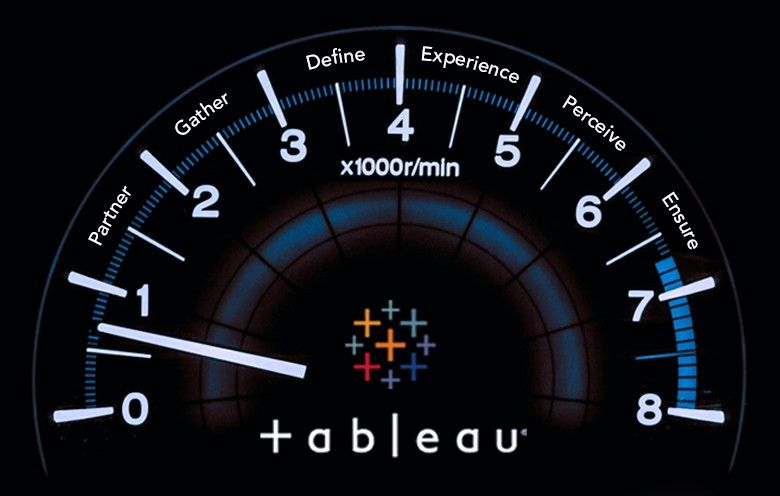Are you thinking to enable Tableau CRM in Salesforce but unsure where to begin or how to use it for your project planning? This blog post assumes that you want to discover the story of your data with Tableau CRM Analytics and will focus on tips for using it.
Tableau CRM is a versatile solution that can be tailor to meet two distinct needs. Firstly, you gain the ability to provide users with actionable knowledge and secondly, your executives can increase their capacity to recommend specific actions based on this understanding.
Why should you use Tableau CRM Analytics?
Agility has long been a defining characteristic of successful enterprises. But in today’s changing world, agility is no longer a competitive advantage. Then what drives competitive advantage? Smart analytics is the answer.
Tableau CRM Analytics, powered by AI, enables businesses to move from insights to act fast and easily in Salesforce. Tableau CRM combines Tableau’s visualization skills with Salesforce Einstein’s AI and ML analytics capabilities, making it one of the leading advantages. Here are a few compelling reasons to enable Tableau CRM in the Salesforce platform:
Automate the discovery process– Search your data for easy answers to complicated business questions. With transparent, understandable AI models, learn what happened, why it happened, what will happen and what to do about it.
Pay close attention to the outcomes– Tailoring analytics to your organization’s needs will provide you with the exact information you require. With precise recommendations and specific guidance, you can improve your corporate outcome.
Assemble on a single platform– Eliminate the need for different systems and logins. Bring all your data, even from external systems into a single platform to create complete visualizations, forecasts and insights.
Take immediate actions– From the moment of insights to taking immediate action such as collaborating, updating records and sharing dashboards, with Tableau you can expect to make quick decisions.
Create with a few clicks– Don’t waste hours coding or waiting in the IT queue. Use an easily adjustable template, third-party apps, or custom-built dashboards to swiftly create dynamic experiences.
What are the planning and implementation tips for Tableau CRM?
Tip 1: Partner with a Salesforce implementation consulting company
It is crucial to ensure that you have enough resources on hand to complete your project before you begin. Hence, the first tip is to partner with an expert, because if your Tableau CRM implementation is poor, your users may experience issues such as data refresh delays or even worse, outdated or invalid data, which can cause them to lose faith in its usefulness.
Tip 2: Gather the right specifications for your ideal outcome
Requirements are a necessary part of any project; thus, they should be clearly understood. They should be viewed as a wish list for the project’s ideal end and how your team foresees Tableau’s analytics performing for your organization. Therefore, your scope and measure should always be well thought out.
Tip 3: Define the level of granularity needed for end-users and start developing dashboard components by dissecting the data model
Tableau CRM’s biggest appeal is that it performs with Salesforce data. Besides, Tableau CRM is designed to handle data migrated from another data warehouse. This can allow your users to deal with data familiarly and also attain a better understanding of the Tableau CRM dashboard and how data is represented.
Tip 4: After you have the initial design ready, ensure you keep it updated
To ensure that your Tableau CRM dashboard and apps remain intact and end-users receive a consistent, high-quality experience, it is essential to gather feedback, work with a few tweaks and redesigns if needed to improve. Therefore, keep an open eye for implementation regularly to check if any problems are affecting your users.
Tip 5: Understand the value of a strong analytics approach
If you are among those enterprises that rally around the vision of delivering superior customer experiences, then long-term technology goals should be sustained. When you cherish the importance of the benefits of a good analytics strategy firsthand it will be easier for you to build momentum for future growth by showcasing real wins.
Tip 6: Ensure success by implementing end-to-end change management and training
According to McKinsey & Co research, the majority of transformation initiatives fail because humans are hard-wired to resist change and because the way humans think about change is complicated. Although your internal teams may feel unpleasant and disruptive, end-to-end change management and consistent training will keep you ready for success.
What should you look forward to?
Tableau CRM Analytics delivers to enterprises with AI-driven forecasts and real-time actionable data, right within your existing workflow. Users with permissions have access to the data and self-service analytics; hence, you can make your predictions instead of relying on analysts and reports.
Begin with templates tailored to your industry as well as pre-built Tableau CRM data integrations, workflows and dashboards. At Softweb Solutions, we offer analytics solutions, regardless of your sector. We can help you set up Tableau CRM for your business and deliver a comprehensive solution. To discover more, have a look at our Tableau consulting services.



